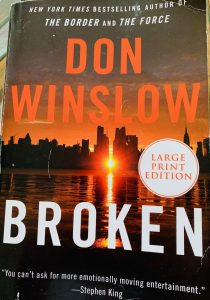I saw a Tweet the other day from Canadian author Andrew Pyper promoting a course he’s teaching on writing suspense and it reminded me of something.
Pyper is a good writer. I’ve read some of his books before and he’s the kind of writer who has the skill and talent to write any genre he wants. Those are the kind of writers I like to read. But what his Tweet reminded me of is that for a romance writer such as myself, there are many little tricks in the suspense author’s bag that can be helpful to a writer like myself.
is a good writer. I’ve read some of his books before and he’s the kind of writer who has the skill and talent to write any genre he wants. Those are the kind of writers I like to read. But what his Tweet reminded me of is that for a romance writer such as myself, there are many little tricks in the suspense author’s bag that can be helpful to a writer like myself.
Currently I’m reading Don Winslow’s “Broken”, a collection of novellas based on his drug cartel fiction series that includes “The Power of The Dog”, “The Cartel” and “The Border”, all based on the Mexican drug war. I love Winslow’s books because they’re fast paced, very suspenseful and well written. He knows how to tell a good story, and that’s why I’m reading “Broken”.
What Winslow and Pyper and other suspense/thriller writers remind me of is the power of the story, and that this power of a well-written story is exactly what keeps readers hooked and wanting more. These books are all very action driven. Characters don’t spend much time in their own heads. There’s action on every page, and this action not only propels the story forward but we get to know the characters through action (theirs and the things that happen to them). Dialogue is pretty short and to the point. Backstory and flashbacks and side narratives are rare, and when they appear, they’re pretty brief.
Don’t get me wrong, romance and literary fiction have action too, but much more time is spent on the characters…what’s in their head, what they’re observing, what others’ are observing or thinking about them. The character’s goals are more internal than external, and so we have to spend more time in their heads. But sometimes these books spend too much time navel gazing at the expense of the story. Reading a thriller or suspense novel keeps me motivated to write characters that are also doing and not just thinking, that everything is not about them all of the time. Sometimes you have to get that character out of the chair and doing something, or having something done to them, that goes on to change or affect that character’s goals and journey.
So the next time you feel stuck as you’re writing your romance or literary novel, I highly recommend picking up a suspense or thriller or sci-fi novel and open your mind to what those books can offer.
Oh, and it works both ways. Someone please tell suspense/thriller writers that they can learn a thing or two about character development by reading literary fiction or romances 😉